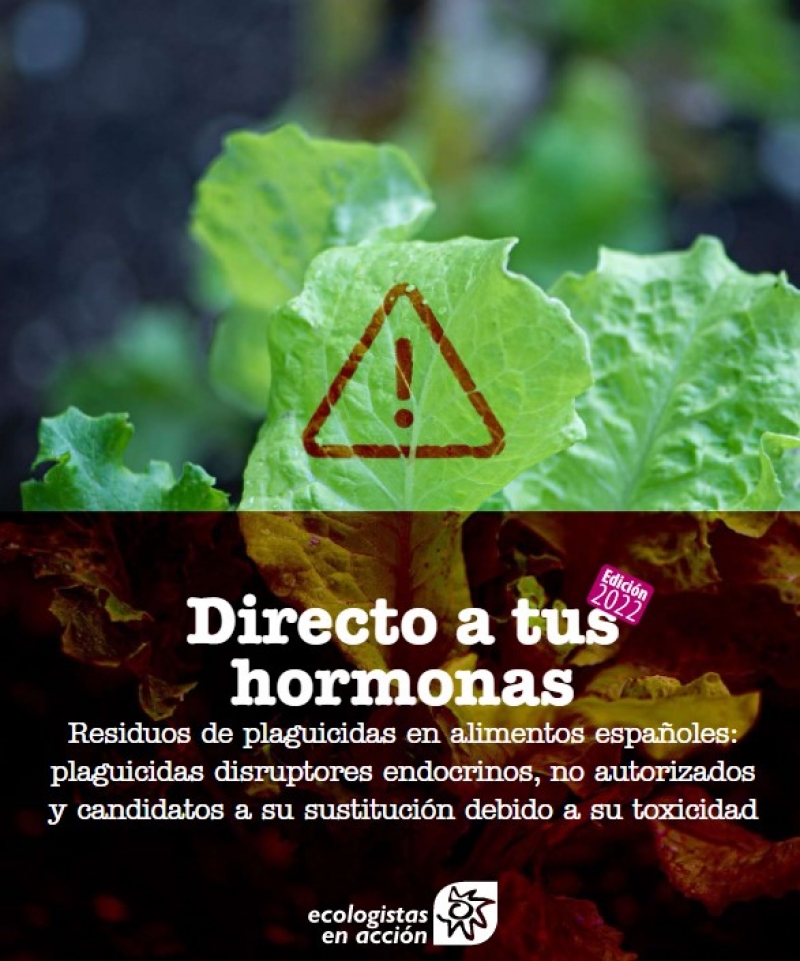A lot of food sold in Spain is contaminated with pesticides. Some 125 pesticides were found in 35% of the samples analyzed (57 endocrine disruptors, 64 unauthorized, and 13 candidates for substitution and 4 are on our Toxic 12 list). Fruit and vegetables are the group where the highest number of pesticide residues have been detected with 41% of the samples contaminated. The report ‘Straight to your hormones‘ was carried out by our member Ecologistas en Acción denounces that Spain is the European state with the worst official controls on pesticides in food, with 3 samples per 100.000 inhabitants, compared to the European average of 17.
The report is based on the latest official data available for 2020 from the Pesticide Residue Monitoring Programme, compiled by the Spanish Agency for Consumer Affairs, Food Safety and Nutrition (AESAN). The report focusses on three groups of substances:
- Pesticides that affect our hormonal system, called endocrine disruptors,
- Pesticides that are not authorised but still present in our food
- The most dangerous authorised pesticides or candidates for substitution by the authorities due to their high toxicity.
Main findings in the report:
- Spain remains the European leader in pesticide sales, with 75,775 tonnes sold in 2020. The trend in pesticide sales has not declined in recent years, making it very difficult to meet the EU Farm to Fork Strategy target of a 50% reduction in the use and risk of synthetic pesticides by 2030.
- Spain only analyses 3.26 food samples per 100,000 inhabitants, compared to the EU average of 17.25, which puts the country at the bottom of Europe in complying with this legal obligation.
- In addition, Spain is testing fewer food samples for pesticide residues each year. In four years, it has halved the number of food samples collected. This means less information for the population about substances that can affect their health.
- In 2020, 125 different pesticides were contaminating Spanish food.
- Although only 1.75% of the samples exceeded the legal limit, it is of concern that 35% of the food had some residue of a pesticide, often several pesticides at the same time.
- Residues in small quantities can cause health effects in the case of pesticides with the ability to affect the hormone system, so-called endocrine disrupting pesticides or EDCs. In 2020, 57 of these pesticides were detected in food (58 if we include DDT, which has been banned for years).
- Fruit and vegetables are the group where the highest number of pesticide residues have been detected with 117 pesticides (52 EDCs) contaminate 41% of the samples.
- The two foods with the highest number of pesticides were oranges with 36 substances (27 EDCs) and sweet peppers with 27 (17 EDCs). The specific food with the most pesticides varies from year to year but what persists is the significant contamination of fruit and vegetables from industrial agricultural production.
- 13% of the samples of animal origin analysed contained pesticide residues. This figure rises to 57% for fish and seafood samples.
- In 2020, AESAN only analysed two samples of food from organic farming, not enough to be representative.
- They found 64 residues of substances not authorised by Europe.
- In addition, Spain does not analyse residues of pesticides with very high use such as the carcinogenic and banned 1,3-dichloropropene.
Candidates for Substitution:
Thirteen pesticides detected (10%) belong to the list of "candidates for substitution". These are highly hazardous substances that, despite being authorised, should be replaced as soon as possible by less hazardous alternatives. Four are on our Toxic 12 list that should be banned immediately because they pose great harm to nature and/or to health. They are the insecticides Lambda-Cyhalotrin and Pirimicarb, the herbicide Pendimethalin and the fungicide Tebuconazole. See for more information our Toxic 12 campaign.
With the above data, Ecologistas en Acción believes that a change in legislation is essential, as the current legislation does not protect the population against pesticides present in food, especially those that alter the hormonal system.
In addition, they see it as urgent that the Spanish administration makes a real effort to:
- Reduce the dependence of agriculture on pesticides, promoting the change to agro-ecological agriculture that will help to meet the reduction objective set out in the European strategy "from farm to fork",
- Improve food testing to provide more representative information to the public, including on the presence of pesticides that are used in higher quantities in agriculture, such as the banned carcinogen 1,3-dichloropropene or glyphosate.
- Avoid supposedly exceptional permits for unauthorised pesticides, restricting them to genuine emergency situations,
- Comparative assessment of candidate substances with their existing alternatives in order to progressively replace them with more sustainable ones.
The full report in Spanish can be found here on the website of Ecologistas en Acción.
Read more?
- Forbidden Fruit, report on the rising residues of toxic pesticides on fruit
- Pesticide Paradise , How industry and officials protected the most toxic pesticides
- Ban Toxic 12, campaign to ban the most toxic pesticides immediately
